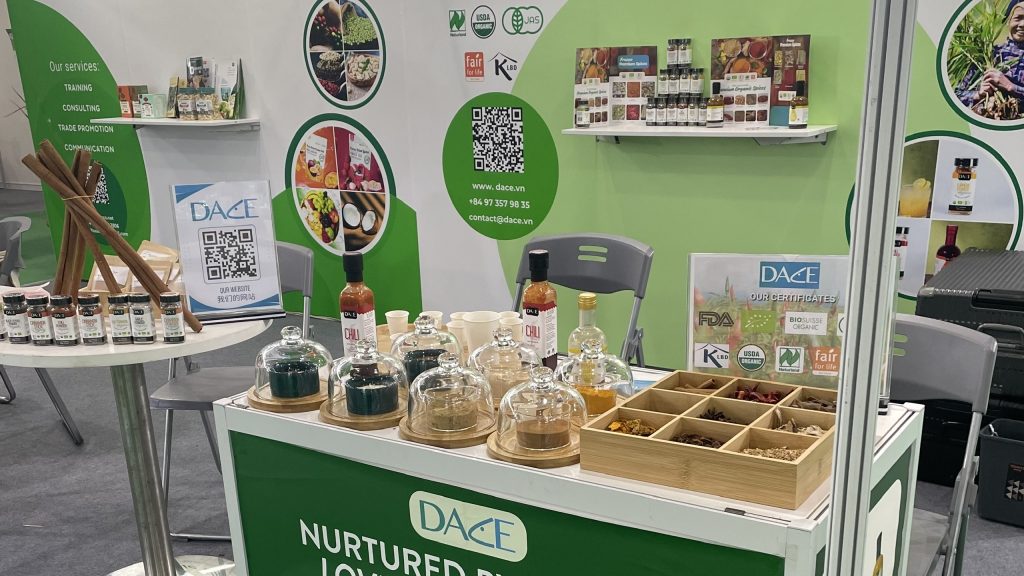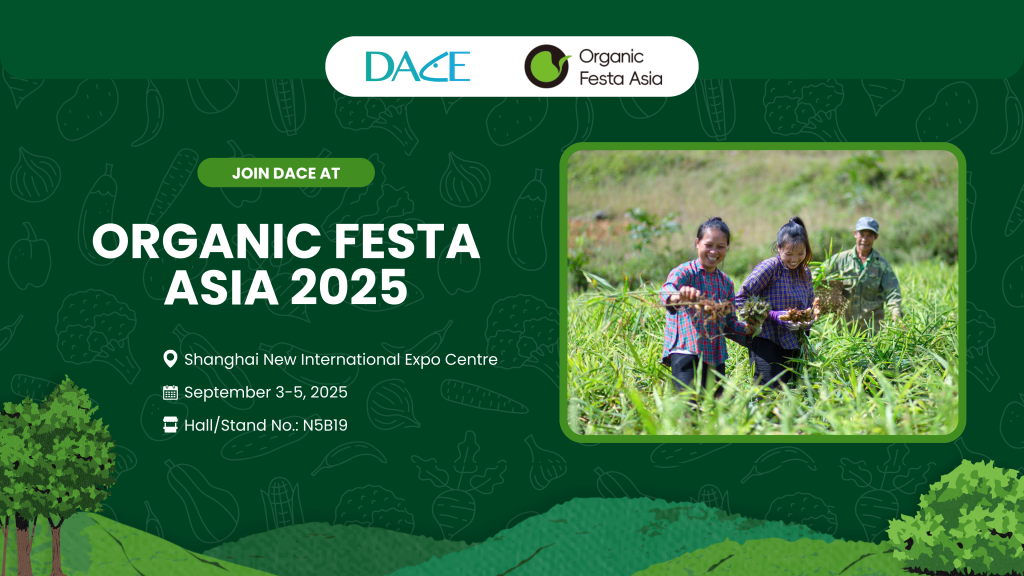DACE at the 8th Organic Asia Congress 2025: A Convergence of Vision and Action for a Sustainable Future
From September 17th to 19th, 2025, Ninh Bình, Vietnam became the center of Asia’s organic agriculture movement as it hosted the 8th Organic Asia Congress (OAC 2025). The event gathered over 550 delegates from 33 countries and territories, all united by a common goal: to accelerate the transition to sustainable and resilient food systems through organic agriculture.
DACE was honored to participate in this significant gathering, engaging with global leaders, policymakers, farmers, and innovators. The congress provided a powerful platform for sharing knowledge, forging partnerships, and charting a collective course toward a better future.

A Global Market, An Asian Opportunity
The congress opened against the backdrop of a booming global organic market, which has surged past €135 billion (approximately USD $160 billion), with China now ranking as the world’s third-largest market after the United States and Europe.
Mr. Marco Schluter, Vice President of IFOAM – Organics International, set the stage by highlighting the movement’s critical juncture: “The global organic movement is at an important crossroads. Climate change, biodiversity loss, and food security challenges place organic agriculture before both opportunities and challenges.” He projected an optimistic future, noting that global sales could reach $600 billion within the next decade, driven significantly by growing demand in Asian urban centers where concerns about health and food safety are rising.

Vietnam’s Strategic Commitment to Organic Growth
As the host nation, Vietnam showcased its remarkable journey and strategic commitment to organic agriculture. The progress was made possible by a strong legal framework, including Decree 109/2018/ND-CP and the National Organic Agriculture Development Program for 2020-2030. Mr. Trần Anh Dũng, Vice Chairman of the Ninh Bình Provincial People’s Committee, powerfully framed the urgency: “Food security, public health, and the balance of ecosystems are all under threat. Organic farming is no longer a trend but a strategic path, ensuring harmony and sustainability.”
The province of Ninh Bình served as a living case study. By 2024, it had expanded its organic footprint to include 26ha of certified medicinal plants, over 5,000ha of rice, and 700ha of vegetables grown to national organic standards. Furthermore, by linking organic farming with its robust tourism sector, as seen in models like the Tam Cốc golden rice fields and Múa Cave lotus pond, Ninh Bình has attracted 31.7 million visitors and generated VNĐ31.1 trillion (approx. $1.2 billion) in revenue from 2020-2025.
Ms. Jennifer Chang, Executive Director of IFOAM Asia, praised Vietnam’s rapid ascent: *”Since the establishment of the Vietnam Organic Agriculture Association (VOAA) in 2011, cultivated organic land has expanded to hundreds of thousands of hectares by 2023, making Vietnam one of the fastest-growing markets in Southeast Asia.”*
A Tapestry of Global Perspectives and Solutions
A core strength of the congress was the diversity of experiences shared by delegates from across Asia.
-
China’s Systematic Approach: Mr. Ngô Chấn Đào, Vice President of the China International Agricultural Exchange Association, emphasized the role of a robust certification system. “China considered quality certification a key tool to shape the organic industry from the early days. Building a unified national certification system and a ‘one product – one code’ traceability mechanism not only creates transparency but also strengthens consumer trust.”
-
Sikkim, India’s Political Will: Mr. S. Anbalagan, Director of the Sikkim Organic Development Agency, shared a lesson in determination. He detailed Sikkim’s over-decade-long journey to eliminate chemical fertilizers, resulting in it becoming the world’s first fully organic certified state. His story affirmed that “strong political commitment and social consensus can create a historic turning point.”
-
Bhutan’s Holistic Philosophy: Representing the Bhutanese Ministry of Agriculture and Livestock, Ms. Kesang Tshomo connected organic farming to the nation’s core philosophy. “Organic and ecological agriculture must be tightly linked with Bhutan’s tradition… We will increase investment, promote mechanization, apply digital tools, improve productivity, and promote contract farming. These are key factors for the development of a sustainable organic agriculture.”
-
The Philippines’ Focus on Youth: Addressing a critical global challenge—the aging farmer population—Ms. Bernadette F. San Juan, National Organic Agriculture Program Coordinator from the Philippines, presented their successful Youth Internship in Organic Agriculture (YIPOA). This program is designed to “ignite organic passion in the youth, thereby turning organic agriculture into an income-generating profession.”
-
Japan’s Organic City Model: Mr. Yoshikuni Watanabe, Mayor of Kisarazu City, Japan, introduced their innovative “Organic City” concept. By introducing organic rice into school lunches, starting with 5 farmers in 2019 and now reaching 70% organic school rice, the city creates stable demand and fosters local pride. “The lesson learned is that ‘public procurement’ through school lunches not only creates stable demand but also helps educate, build culture, and turn agriculture into a local pride,” he shared.
The Road Ahead: Collaboration and Innovation
The consensus was clear: while the paths may differ, the destination is the same. The organic movement must remain steadfast in its core principles while innovating in practice. As Mr. Schluter urged, “Strategic cooperation between organic and other ecological movements will create collective strength to counter degenerative production models.”
The 8th Organic Asia Congress concluded not as an end, but a beginning. It reinforced the vital role of collaboration, policy support, and consumer education. For DACE, the insights gained on certification, supply chain transparency, youth engagement, and circular economy models are invaluable. They will directly inform our strategies and initiatives as we continue our mission to support sustainable agricultural development.

We extend our deepest gratitude to the organizers, IFOAM Asia, the Vietnam Organic Agriculture Association, and the people of Ninh Bình for their warmth and impeccable hospitality. We are inspired and ready to contribute to an organic, prosperous, and resilient future for Asia.





